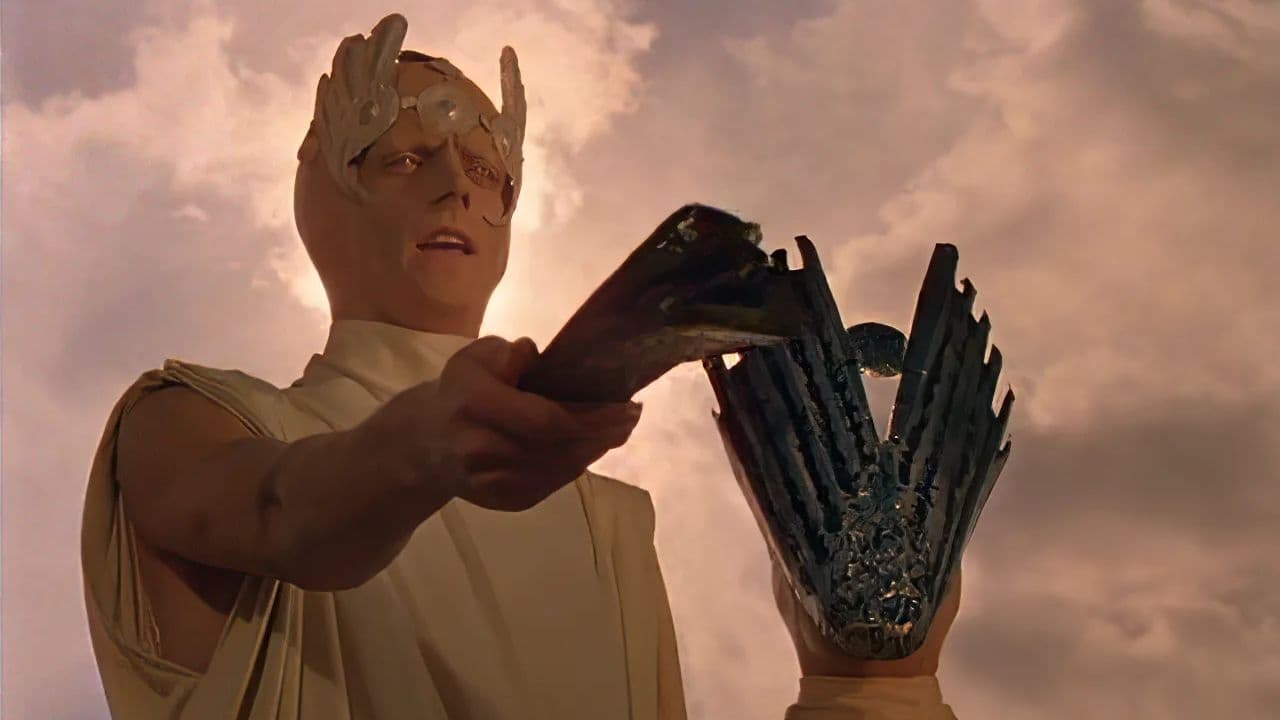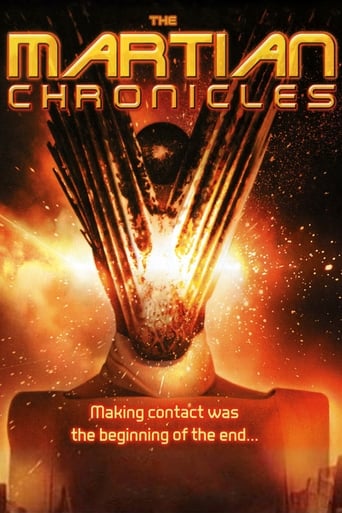

People are voting emotionally.
... View Morea film so unique, intoxicating and bizarre that it not only demands another viewing, but is also forgivable as a satirical comedy where the jokes eventually take the back seat.
... View MoreThis is a must-see and one of the best documentaries - and films - of this year.
... View MoreOne of the most extraordinary films you will see this year. Take that as you want.
... View MoreI just re-watched this series after not having seen it for nearly 40 years and found the fond memories of it from my youth were not entirely displaced. It has some very good moments, the music is superb, the Martians look (and come across as) suitably alien without the need for elaborate make-up and the Martian city is very evocative. For all that the terrible science and awful 80's production values weigh it down so much. I really find it hard to take seriously a sci-fi series where people jet back and forth between Earth and Mars like there's an interplanetary bus service, alight on an unexplored planet wearing uniforms instead of space suits, or worse apparently making the interplanetary journey neatly dressed in the best of California casual. The Martian settlements look cheap and awful (would they really let towns on Mars look like particularly dicey truck stops?). Yet in between its cornier moment there are some really good things to like. Rock Hudson and Darren McGavin as the main recurring characters do a good job with a pretty hokey script, some of the scenes featuring the Martians are beautifully filmed and suitably evocative (Hudson's final dialogue with the ghost Martian is a highlight), and the whole "lets not mess up Mars like we did Earth" thing, which could have been corny, is handled well. There's enough here to keep you interested, even if you do want to bury your head sometimes at the awfulness of the special effects, I'm glad to see at least some of my youthful enthusiasm was not misplaced.
... View MoreThis film had a lot of good things going for it. Based on Ray Bradbury's novel, with the equally talented Richard Matheson doing the screenplay. A top notch cast including Rock Hudson, Roddy McDowell and Darren McGavin.So where did it go wrong. Well, first, the cheap special effects. I think they went with this because this was the post-Star Wars Science Fiction craze, but Star Wars had so raised the bar on special effects, that the tired models on wires method just wasn't going to satisfy anymore.Second, Bradbury's novel is a collection of short stories strung together with a common thread. Some of the stories were published previously, and Bradbury included them in an overall book. Matheson decided to play up recurring characters in order to give the story more of a narrative, including Hudson's character.Overall, it doesn't work. Bradbury's ornate writing doesn't translate well to the screen despite the best efforts of Matheson and the actors.
... View MoreIt was you're comments that prompted me to sign up and respond. I was 11 y.o. when the M.C. were released on American TV. To this day, I remember the many different creepy feelings that remained with me for weeks, after each episode. Though I had nightmares every night, of actually living out each episode, I still could not resist watching the next story. Each following day, I would continuously stare up at the sky. I would wonder if each story was real, and if the Martians were using Hollywood, to pass their message. Also, I often wondered if my family was real. It indeed, marked me as well. I have not seen the stories since, but now, I can hardly wait!
... View MoreFirst off, Ray Bradbury is my favorite author, and CHRONICLES is one of my favorite books (really a collection of short stories). So, getting my own bias out of the way...onto the miniseries. First, it's adapted by Richard Matheson (another favorite writer of mine--more bias! Sorry!). Taking the disjointed collection of short tales about colonizing Mars and trying to turn it into a cohesive whole couldn't have been easy. And in many places, the right choices were made. In other places, they were not. First, the casting; Rock Hudson sleepwalks through the lead as Col. Wilder (the only thread connecting the stories in this version), giving an uninspired, lifeless performance (This from the lead actor in SECONDS? Inexcusable). Bernie Casey as the tortured Spender (the astronaut who goes 'native') is a vast improvement. Others include Roddy McDowell and Fritz Weaver as a pair of missionaries; both do decent turns here. There are many others in the large cast, resulting in a mixed bag of performances. The music, like the acting, oscillates wildly; from corny, dated disco cues (yech) to haunting woodwinds and choral effects (evoking a dream-like quality; very well done!). The production design is a (seemingly) deliberate, low-tech approach. Particularly, the abandoned Martian structures with their sharp, stony angles reminiscent of bleached, dried bones; truly looking like a "dead" alien city. The Martians themselves look a lot like David Bowie's MAN WHO FELL TO EARTH (straying far from Bradbury's accounting) for a more ethereal look. Ignoring scientific accuracy in favor of Bradbury's lyrical romanticism and metaphor was a bold, true choice for the material. Frankly, there aren't many other ways to adapt these tales; which really are reflections on humanity rather than ruminations about aliens (as the best sci-fi tales usually are). Large chunks of dialogue remain true to Bradbury's prose, but the less faithful scenes tend to stand out rather badly. The early rocket miniature effects sequences are crude and poorly shot(even by early '80s standards); they should have been cut out or reduced to a few lines of dialogue. Special effects were not the miniseries' strong suit, and should never have been highlighted! However, just seeing these stories come to life in any way was entertaining; and compared to what little network sci-fi TV was on at the time (BUCK ROGERS for example), it was an oasis! But after seeing some of the Martian tales redone(somewhat better; with a smaller budget)a few years later for the cable TV series RAY BRADBURY THEATER, one can't help but wonder, 'What if?' I still feel there is a way to bring this book to life, perhaps as a cinematic series of unrelated vignettes (like TWILIGHT ZONE: THE MOVIE, only better I would hope). If done well, it could signal a new era for anthology films; like the classic TALES FROM THE CRYPT (1972) or BLACK SABBATH (1963). No need to link the stories (especially in such a ham fisted way as the use of the Col. Wilder character was). Just let the Bradbury tales work their magic for a new generation of moviegoers or TV viewers. The mini-series is not really that bad. It's just that, while watching it, you can't help wondering how it could've been so much more!
... View More